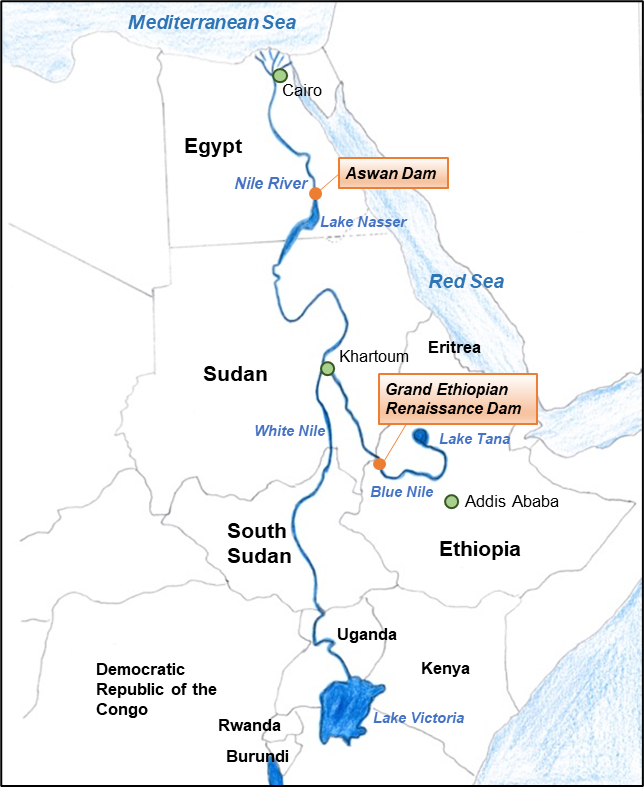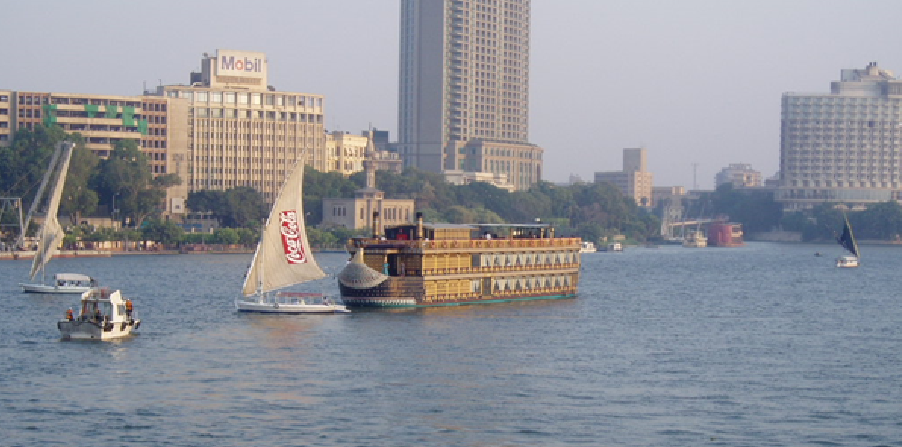IDE Research Columns
Column
The Role of Sudan in Egypt’s Waning Hegemonic Position in the Nile Basin
Housam DARWISHEH
Institute of Developing Economies, JETRO
February 2023
Historically, Egypt has enjoyed a long-standing hydro-hegemonic position in the Nile basin. However, major shifts in regional power structures have challenged Egypt’s domination over the Nile. This is particularly true for Ethiopia, as it began building the Grand Ethiopian Renaissance Dam (GERD) in 2011 without prior consultation with Egypt. The GERD resulted in a major dispute between the two countries. However, news coverage of the dispute almost entirely overlooks Sudan’s influence on shifting the balance of power within the Nile basin. This research aims to investigate the decline of Egypt’s hydro hegemony, the factors that resulted in the waning of the decades-long Egyptian Sudanese alliance, and Sudan’s role in the reconfiguration of the hydro political landscape in the Nile Basin.
Background
Egypt previously controlled the Nile waters with a combination of material, institutional, and ideational sources of power. Embroiled in prolonged civil conflicts, acute instability, and underdevelopment, the majority of the upstream states could not utilize the Nile waters—except for Sudan owing to its fertile lands and vast agricultural potential. Therefore, for Egypt, controlling Sudan’s policies over issues pertaining to the utilization of waters has facilitated a steady and continuous flow of the Nile. Consequently, for decades, Egypt maintained a hydro political alliance with Sudan despite the two states’ differences and frictions in other areas. However, in recent decades, Sudan has reduced its previous support for Egypt.

Figure 1: Map of the Nile Basin Region
Source: Drawn by the author
I argue that Egypt’s loss of Sudan’s unconditional support for its “water rights,” contained in bilateral water agreements, has changed the former’s long-standing hegemonic position in the Nile basin in favor of Ethiopia. Sudan’s shifting hydro political position has been predominantly driven by three developments; first, the decline of Egypt’s material and ideational power in the Middle East and Africa; second, Egypt’s increasing dependence on substantial financial assistance from the oil-rich Gulf states, which seek to improve their food security by increasing their physical, political, and economic presence in the Nile basin; and third, the emergence of new power relations between upstream, downstream, and non-riparian states have reconfigured the hydro political landscape of the Nile basin in favor of upstream states.
Egypt and Sudan: A Peculiar Relationship
Egypt once claimed Sudan as an integral part of its own territory. The claim began with the Turco-Egyptian invasion and rule of Sudan in 1820 by Muhammad Ali Pasha who aspired to create an Egyptian empire. The Egyptian rule in Sudan was overthrown in 1885 by the Sudanese Mahdist revolt; however, it was restored 14 years later following the Anglo-Egyptian invasion of Sudan in 1898. Until it gained independence in 1956, Sudan was recognized nominally under the Anglo-Egyptian Condominium as an Egyptian possession.
For most of the 20th century, and into the 21st century, Egypt locked Sudan in an asymmetric dyad over the Nile waters through institutional arrangements, constituted primarily by two Nile waters agreements of 1929 and 1959. These agreements enabled Egypt to sustain water supply and favorably maintain its hegemonic control of the Nile. Embroiled in prolonged civil wars and failing to maintain a centralized and stable state, the security of the Sudanese ruling elite has often been influenced by Egypt, molded through historical experiences and the long-standing power asymmetry between the two countries regarding military, economic, and political capabilities (Elnur 2009).
Egypt, the Decline of a Regional Hegemon
Several developments were central in facilitating the decline of Egypt’s hegemony in the Nile basin. First, the collapse of Egypt’s material and symbolic hegemony in the Middle East and Africa following its defeat in the 1967 war against Israel made several states question the foundation of Egypt’s populist model of development. Second, a series of international events inflicted a heavy toll on Egypt’s standing as a regional power. Following the war with Israel in October 1973, Egypt’s foreign policy was reoriented toward the West, making peace with Israel and breaking with the Arab and African worlds. An Egyptian diplomat once noted, “Sadat is a Westerner, his dream is that his country would become part of Europe. Belonging to Europe is more important than belonging to Africa or the Arab world” (Ajami 1979). In addition, following the oil price shocks of the 1970s, wealth shifted to the Gulf Arab states, deepening Egypt’s economic decline and external dependency. Sadat’s successor, Hosni Mubarak, was preoccupied with preserving regime security and grooming his son to succeed him. Under his rule, Egypt was unenthusiastic about the African Union and viewed Africa through a security prism. Following an assassination attempt on his life during a visit to Ethiopia in 1995, Mubarak did not attend African summits until the Abuja summit of 2005 (Landsberg and Van Wyk 2012, p. 245). At those summits, Ethiopia rallied Nile riparian states to review the 1929 and 1959 Nile water agreements and gain the recognition of their right to equal share and utilization of the Nile waters. Third, a new order of power relations emerged in the Nile basin between the upstream and downstream states. Since the early 1990s, the upstream riparian states have raised their hydro political cooperation and strengthened their collective bargaining power through establishing legal and institutional frameworks such as the Nile Basin Initiative and the Nile Basin Cooperative Framework.
Egypt-Sudan Relations after the 2011 “Arab Uprisings”
The overthrow of President Mubarak in February 2011 after 30 years in power ushered in a turbulent “transition” presided by the armed forces. As the Egyptian government became increasingly preoccupied with survival than with foreign relations, Ethiopia announced plans in April 2011 to construct the Grand Ethiopian Renaissance Dam (GERD). The announcement of the GERD, just 2 months after Mubarak’s fall and 3 months before South Sudan’s independence,1 marked a radical power shift between the upstream and downstream riparian states. Moreover, Sudan’s support for the GERD in 2013 decisively tipped the diplomatic balance in favor of Ethiopia. Without Sudan’s support, Egypt was isolated in the Nile basin, unable to counter Ethiopia’s position. Furthermore, a growing rapprochement and convergence of interests on the GERD between Sudan and Ethiopia forced Egypt to sign the Declaration of Principles (DoP) in March 2015 the, giving Ethiopia the legal right and legitimacy to continue constructing the dam. Crucially, the DoP contained no clause that assured Egypt any water allocation.
As Ethiopia enforced its control of the Nile waters, Sudan retreated from its previous unconditional support of Egypt’s “historic rights” to the Nile River. In addition, its decision was economically motivated. To offset the loss of oil revenues following the succession of South Sudan in 2011, Sudan sought to raise productivity in agriculture, which necessitated regular flow of the Nile and cheap energy supply from the GERD. Sudan believed the GERD could alleviate the threat of annual floods and improve drought control to sustain year-round agriculture and attract foreign investments from the Middle East and Arab Gulf states. Therefore, regularizing the flow of water throughout the year makes it feasible to expand irrigated agriculture along the Nile, which will also increase the presence of non-riparian actors that seek to achieve food and water security through agricultural investments in the basin. This prospect worries Egypt more than the Ethiopian GERD itself because Sudan would predominantly increase its water consumption. Currently, Sudan ranks first in Arab Gulf investment in agricultural projects and animal-based industries. The Gulf investments in Sudan’s agriculture provided the latter with confidence to chart its Nile basin policy away from Egypt’s concerns. Crucially, the lack of any regional organization for water resource management facilitated the expansion of the Gulf states’ influence in the basin through bilateral deals.
Conclusion
Egypt’s hydro-hegemonic decline in the Nile basin reflects harsh geopolitical and geoeconomics realities. Riparian and non-riparian states are contesting for increasingly scarce resources in the Nile basin. Egypt’s political turmoil following the 2011 uprising and the rising power of the upstream riparian states enabled Sudan to retreat from its previous unconditional support of Egypt’s “historic rights” to the Nile. News coverage of the water dispute between Egypt and Ethiopia almost entirely overlooks Sudan’s strategic position as a midstream state that accelerated the basin’s hydro political shift in Ethiopia’s favor. Sudan’s influence in the Nile dispute derives from its significant potential to expand its irrigated agriculture, which would lower the volume of the Nile waters flowing into Egypt. In addition, Gulf sovereign wealth funds have enlarged their stake in irrigated agriculture and farming schemes in the Nile basin. These projects may exacerbate existing water disputes within the region due to climate change and rapid population growth. Moreover, the Nile basin’s regional order is being molded by China, Turkey, and above all, the Gulf Cooperation Council states, each with its own economic and security interests.
Notes
- Based on the 2005 Comprehensive Peace Agreement between the Bashir regime and the southern rebel forces of SPLM, Sudan was split into Sudan and South Sudan in January 2011.
Author’s Note
This column is based on the following work.
Darwisheh, Housam. 2021. “Sudan and Egypt’s Hydro-Politics in the Nile River Basin.” IDE Discussion Paper no. 818. https://www.ide.go.jp/English/Publish/Reports/Dp/818.html
Reference
Ajami, Fouad. 1979. “The Struggle for Egypt’s Soul.” Foreign Policy (35): 3–30.
Elnur, Ibrahim. 2009. Contested Sudan: The Political Economy of War and Reconstruction. London: Routledge.
Landsberg, Chris, and Jo-Ansie Van Wyk, eds., 2012. South African Foreign Policy Review. Vol. 1. Pretoria: Africa Institute of South Africa.
*Thumbnail photo: Nile river in Cairo, taken by the author
**The views expressed in the columns are those of the author(s) and do not represent the views of IDE or the institutions to which the authors are attached.


